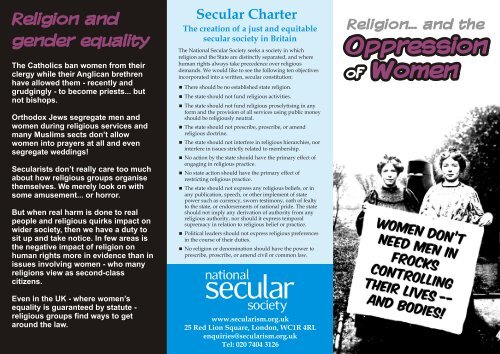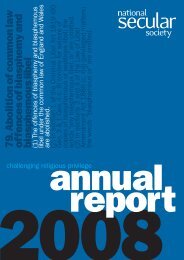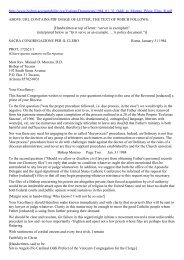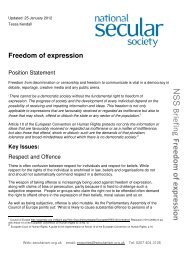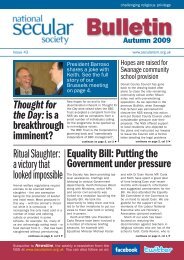Women's Rights - National Secular Society
Women's Rights - National Secular Society
Women's Rights - National Secular Society
Create successful ePaper yourself
Turn your PDF publications into a flip-book with our unique Google optimized e-Paper software.
Religion and<br />
gender equality<br />
The Catholics ban women from their<br />
clergy while their Anglican brethren<br />
have allowed them - recently and<br />
grudgingly - to become priests... but<br />
not bishops.<br />
Orthodox Jews segregate men and<br />
women during religious services and<br />
many Muslims sects don’t allow<br />
women into prayers at all and even<br />
segregate weddings!<br />
<strong>Secular</strong>ists don’t really care too much<br />
about how religious groups organise<br />
themselves. We merely look on with<br />
some amusement... or horror.<br />
But when real harm is done to real<br />
people and religious quirks impact on<br />
wider society, then we have a duty to<br />
sit up and take notice. In few areas is<br />
the negative impact of religion on<br />
human rights more in evidence than in<br />
issues involving women - who many<br />
religions view as second-class<br />
citizens.<br />
Even in the UK - where women’s<br />
equality is guaranteed by statute -<br />
religious groups find ways to get<br />
around the law.<br />
<strong>Secular</strong> Charter<br />
The creation of a just and equitable<br />
secular society in Britain<br />
The <strong>National</strong> <strong>Secular</strong> <strong>Society</strong> seeks a society in which<br />
religion and the State are distinctly separated, and where<br />
human rights always take precedence over religious<br />
demands. We would like to see the following ten objectives<br />
incorporated into a written, secular constitution:<br />
§<br />
§<br />
There should be no established state religion.<br />
The state should not fund religious activities.<br />
§ The state should not fund religious proselytising in any<br />
form and the provision of all services using public money<br />
should be religiously neutral.<br />
§ The state should not prescribe, proscribe, or amend<br />
religious doctrine.<br />
The state should not interfere in religious hierarchies, nor<br />
§<br />
interfere in issues strictly related to membership.<br />
No action by the state should have the primary effect of<br />
§<br />
engaging in religious practice.<br />
No state action should have the primary effect of<br />
§<br />
restricting religious practice.<br />
§ The state should not express any religious beliefs, or in<br />
any publication, speech, or other implement of state<br />
power such as currency, sworn testimony, oath of fealty<br />
to the state, or endorsements of national pride. The state<br />
should not imply any derivation of authority from any<br />
religious authority, nor should it express temporal<br />
supremacy in relation to religious belief or practice.<br />
§ Political leaders should not express religious preferences<br />
in the course of their duties.<br />
No religion or denomination should have the power to<br />
§<br />
prescribe, proscribe, or amend civil or common law.<br />
www.secularism.org.uk<br />
25 Red Lion Square, London, WC1R 4RL<br />
enquiries@secularism.org.uk<br />
Tel: 020 7404 3126<br />
Religion... and the<br />
Oppression<br />
of<br />
Women
Religion and the<br />
Oppression<br />
of<br />
Women<br />
In 1995, following the Beijing Conference on Women, the<br />
reinforcing the notion of “women as property”. Those tempted<br />
Vatican took issue with the concept of "women's rights to<br />
to write this off as mere rhetoric should consider that in the<br />
control their own sexuality" and "women's right to control<br />
most fundamentally Islamic countries, for example, an<br />
their...fertility", asserting that these rights should be<br />
“unfaithful” woman can face death by stoning or flogging.<br />
understood to refer only to "the responsible use of sexuality<br />
As secularists, we don’t wish to get involved in the internal<br />
within marriage.”<br />
affairs of religions. Whether, for example, the Church of<br />
After millennia of religious gender-oppression, we are no<br />
England approves women vicars but not bishops, is entirely<br />
further away from casting off the sexist demands of patriarchal up to them. But it certainly is everyone’s business when<br />
theology even if their power and influence is much diminished religious groups campaign to influence the law with regards to<br />
- at least in western democracies. the rights of citizens.<br />
As we explore in the side bar, this obsession with<br />
It surely cannot be right that a doctor working for the NHS<br />
controlling women seems to stem from the desire by religious can make medical decisions based on their own religious<br />
authorities (who are almost always men) to control fertility, or - convictions rather than the needs of the patient.<br />
as they see it - the very source of life. This mania has led to<br />
Nor can it be right that religious courts are given the<br />
untold suffering by women throughout the ages and across<br />
State’s stamp of approval when there are pressing questions<br />
cultures. And it is still with us.<br />
about whether women will get a fair hearing in matters of<br />
The desire to control fertility has necessarily meant the<br />
divorce and child custody or that evidence of domestic<br />
need to control women themselves. Consequently, few<br />
violence will be taken seriously. It is not unreasonable to ask<br />
religions treat women as equals and - since religion and state how Sharia courts in the UK will function when, theologically<br />
were intertwined for most of human history - this in turn has<br />
speaking, a woman’s testimony is worth half that of a man’s.<br />
meant the relegation of women to second-class citizenship.<br />
In the case of Islam, women’s rights activists have a grave<br />
In parts of the Islamic World - following the Cairo<br />
cause for concern: religion is increasingly being used as an<br />
Declaration, that ersatz ‘human rights’ document’ - women are argument to reverse gains feminists have made over the<br />
seen as needing the protection of men, which, in legal terms,<br />
decades. Gender segregation is making a come-back and<br />
means they are not dissimilar to children in status.<br />
horrified critics are denounced as ‘Islamophobic’.<br />
In many cases, the legal inferiority of woman is rendered<br />
Religion is naturally reactionary. The stronger human<br />
visible by forcing women to wear submissive clothing, often<br />
rights culture grows, the clearer the fault lines are.<br />
Maimed by religion<br />
“Whoever finds it serving the interest of his daughters<br />
should do it, and I personally support this under the<br />
current circumstances in the modern world.” With that<br />
statement, leading Islamic scholar Yusuf al Qaradawi<br />
squandered the opportunity to speak out against a<br />
monstrous practice. Worse, while saying it was “not<br />
obligatory”, he appeared to endorse it nonetheless.<br />
Female genital mutilation (FGM) is sometimes called<br />
“female circumcision” but it has very little in common<br />
with the male version. It is designed to rob a woman of<br />
all sexual sensation by cutting out part of the clitoris<br />
and labia to discourage “immoral behaviour”. It is these<br />
(sexual) temptations of the “modern world” that<br />
Qaradawi was talking about.<br />
Dressed up faith<br />
<strong>Secular</strong>ists are generally not concerned with the<br />
strange clothing that religious people choose of their<br />
own free will to inflict upon themselves. However, the<br />
testimony of many women - particularly in the Muslim<br />
community - is that patriarchal forces within some<br />
communities - fathers, uncles, brothers, husbands,<br />
and even sons - rigidly enforce dress codes in an<br />
oppressive way, and often with violence.<br />
On a hot day, how can one look upon the scene of a<br />
woman draped in layers of black cloth covering all but<br />
her eyes while her male relatives are dressed in<br />
comfortable summer fashions and honestly think that<br />
this is a normal situation? It is clearly designed to<br />
marginalise women and cut them off from wider society.<br />
Controlling women by<br />
controlling their bodies<br />
One might be forgiven for thinking that religion treats women<br />
as little more than machines for breeding the faithful.<br />
Religious leaders - almost always men - from across many<br />
different faiths are obsessed both with ensuring that nothing<br />
stands in a the path of a man’s sperm on its way to fertilising<br />
a woman’s egg. When it does, even more pressure is<br />
brought to bear to ensure she carries it to term.<br />
Many religious sects rage against contraception. Some<br />
religious doctors and pharmacists refuse to supply women<br />
with either contraceptive pills or devices. Many more will<br />
certainly not supply a “morning after” pill if a woman fears<br />
she may have become pregnant.<br />
Worse, some groups - notably the Catholic Church - are<br />
even opposed to condoms. They won’t even let men take<br />
responsibility for contraception because they say it<br />
promotes immoral sexual behaviour. It doesn’t seem to<br />
move them in the slightest that campaigning against<br />
condoms puts women at risk not only of unwanted<br />
pregnancies but also of life-threatening sexually transmitted<br />
diseases like HIV/AIDS.<br />
Men make the rules, but all too often it is not men who<br />
have to deal with the consequences of pregnancy. Many<br />
men abscond leaving women to struggle on their own. Often<br />
having a child forces women to have to give up chances of<br />
education or career. Yet it is primarily men who make the<br />
decisions. Not only that, frequently the decisions are made<br />
not on practical grounds, but on religious grounds.<br />
Things heat up even further when contraception is no<br />
longer the issue and abortion is brought forward as an<br />
option. The subject seems to push some religious<br />
extremists even further towards madness. In some cases,<br />
doctors providing abortion services have been murdered.<br />
Ultra-emotive language like “the genocide of the unborn” is<br />
used. Extremists are opposed to abortion even in cases<br />
where a woman or pubescent girl has been raped, the<br />
foetus is badly deformed, or when the mother’s life is in<br />
danger.<br />
Religious groups think<br />
they have been commanded<br />
to “go forth and multiply”<br />
and appear to think that this<br />
means “at all costs” - even if<br />
it means sacrificing the<br />
rights - and sometimes lives<br />
- of women.<br />
A leading 21st Century<br />
medical authority on sex<br />
and reproduction.


